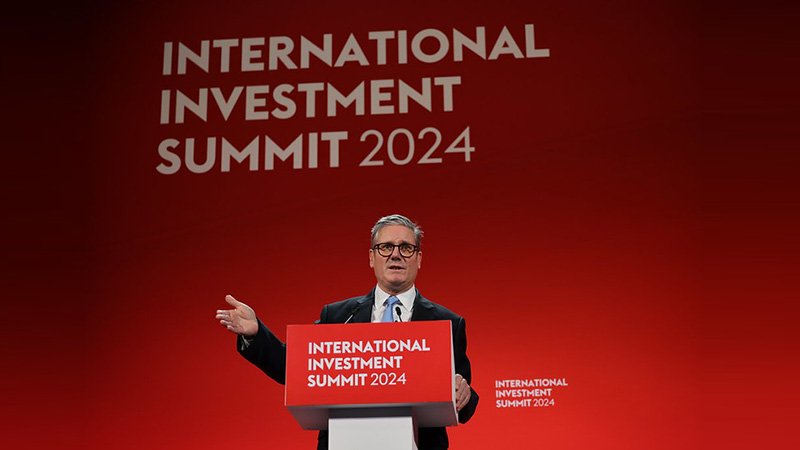Prime minster Keir Starmer pledged to get rid of anti-growth regulation that is delaying infrastructure projects in the UK today (14 Oct) while speaking at the International Investment Summit.
Current regulation is too complex and puts lengthy delays on approvals for projects that would otherwise attract investment to the UK, he added.
“We’ve got to break out of that trap,” Starmer said. “We’ve also got to look at regulation across the piece and where it is needlessly holding back the investment, we need to take our country forward.
“Where it’s stopping us building the homes, the data centres, the warehouses, grid connectors or roads, train lines, you name it, then mark my words, we will get rid of it.”
He highlighted the £4bn East Anglia Two wind farm as an example, which after requiring an initial 4,000 documents for application in 2022, was delayed for more than two more years before finally being granted approval last week.
“As an investor, when you see that kind of inertia, you don’t bother, do you? And that, in a nutshell, is the biggest supply-side problem we have in this country,” Starmer added. “So it’s time to upgrade the regulatory regime, make it fit for the modern age, harness every opportunity available to Britain.
“We will rip up the bureaucracy that blocks investment. We will march through the institutions and make sure that every regulator in this country, especially our economic and competition regulators, take growth as seriously as this room does.”
Starmer began scrapping regulation mere days into his government in July, lifting the de facto ban on onshore wind that had been in place since 2015.
“We need to absolutely champion the brilliance that we’ve got to offer, but we need to get rid of some of the inhibitors,” he said. “And most of my determination to get rid of the inhibitors has been through conversations with people in this room around planning. It takes far too long to get decisions on planning, measured in years, not months. And so we’ve got to streamline that.
“I’m not saying all regulation is bad, but the sheer volume that we’ve got here, and the inconsistency with different regulators or bodies pulling in slightly different directions, means it’s not just the volume of regulation, it’s also the fact that there’s not even a clear landing path for investment. That is what we need to strip away.”
‘It’s tough, but it’s doable’
Cutting regulation could fast-track the building of the energy infrastructure needed for the UK to reach its goal of cutting emissions 68% by 2030. So far, the Climate Change Committee has deemed the UK to be “off track” for delivering on this pledge, meaning less regulation could hasten that.
Starmer noted that the undertaking is still “really difficult” but could provide the UK with greater investment opportunities down the road, namely in artificial intelligence, which consumes huge sums of energy.
If implemented correctly, Starmer said the UK energy grid’s eventual independence, cheaper prices, and ability to scale up free of regulatory backlash, could make it a prime location for AI providers and data centres to settle.
“On the face of it, there’s a tension. But I actually think if we’re smart about this, we can turn that apparent tension into a massive advantage,” he added.
“This is going to be a real game changer over the next five to 10 years, and we have to be at the front of this race. If we become spectators, others will run past us. We cannot allow that to happen.”
A partnership with the private sector
Achieving these goals will require the government to work in partnership with the private sector, according to Starmer.
He said it is the government’s job to set a clear, long-term plan that investors can get behind, and the private sector’s role to use its expertise to execute those plans.
“What’s important in a partnership is that both partners don’t try to do the same thing,” Starmer added. “That the government doesn’t try to do what investors in the private sector are doing, because they do it better, but equally, that we are setting the mission of what we want to achieve.
“Investors need to know they’re happy with the end destination, and then what the government’s role is to make sure that the path is cleared for that to succeed. I think there’s a real window of opportunity here in 2024 for this to happen, and we have to seize it.”
A publicity stunt?
Yet Douglas Grant, Group CEO of Manx Financial Group, said that while he welcomes the news and the “shift in mood”, the timing of the summit itself “raises some concerns”.
“It feels like a classic publicity move, coming just two weeks before Labour’s first budget, which is expected to include tax hikes which will take some of the shine off the news,” he warned. “Why bundle all these positive investment deals together in one event, as it feels more contrived than the natural rhythm of investment?
“Furthermore, we cannot overlook the ongoing fiscal uncertainty that has left many SMEs and households hesitant to invest. The commitments from international giants are encouraging but will not offer immediate relief or drive short-term change. Meanwhile, SMEs, which are the backbone of our economy, are still facing significant pressure.”
He added: “With the highly-anticipated Autumn Statement at the end of the month, UK businesses should seize the opportunity to reevaluate their lending strategies and bolster financial stability in preparation for any potential economic and policy shifts. Higher taxes or inadequate support in the Autumn Statement could further undermine growth, particularly for SMEs, which play a crucial role in job creation and innovation.”










